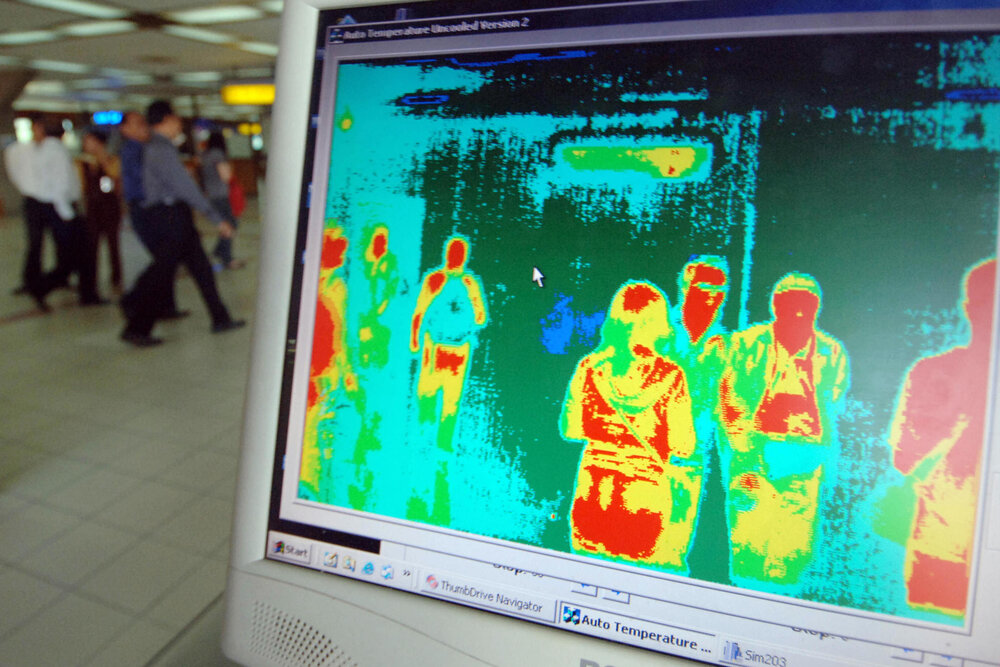Update: See this post for my further thoughts on the situation.
The global spread of coronavirus disease 2019 (also known as COVID-19) is a point of grave concern among travellers at the moment.
Given the rapid rise of global cases over the past few weeks, which has seen the total case count top 100,000 across 100+ countries as of the time of writing, I’m putting together this post to capture my thoughts on the impact of coronavirus on travel all in one place.
Before we begin, keep in mind that I’m not a medical professional, nor do I have any particular expertise in a health field.
My views are therefore purely those of a frequent traveller who’s grappling with the same questions as many of you are, as well as someone with close links to the situation since its early days: I cut short my Chinese New Year trip back home to Beijing shortly after the Wuhan lockdown was announced, and have been in close contact with my self-isolating family members ever since.
With COVID-19 Spreading, Should You Still Travel?
Clearly, there’s no objective way to answer this question, and every potential traveller needs to navigate through the many competing perspectives and decide this for themselves.
Even among my own circles, the consensus varies wildly depending on who I’m talking to: my fellow travel and aviation enthusiasts are eagerly snapping up cheap cash fares and generous award availability throughout the rest of the year, brushing off the coronavirus as “just like the flu”, whereas my concerned family members, who have firsthand experience of a coronavirus outbreak (hi Mom!), are imploring me to cancel all my trips for the rest of the year out of an abundance of caution.
One camp advocates that the chances of you actually catching the virus are ultimately relatively low, that the situation has been over-sensationalized by the media, that the coronavirus is no worse than the flu, and that you could possibly catch the virus even if you stayed at home, so you may as well travel anyway.
While I find it extremely short-sighted to compare COVID-19 to the seasonal flu, given that this is a brand-new virus of which we still understand very little beyond what we can observe, I do agree with the general principle of not allowing a fear of the unknown to govern your life, when every day could in fact be your last. It’s why I forged ahead with my trip to the Maldives, for example, even amidst a clear spike in global case numbers.

But on the other hand, take a look at the world around us – major events have been cancelled at the last minute, world-famous museum and parks are closed, stories of travellers being put into forced quarantine are widespread, and major companies have uniformly advised against non-essential travel.
In the face of a virus with many unknown qualities, this is clearly a time to act on caution and foresight, and I think it’d be entirely reasonable for anyone to consider rescheduling, changing, or cancelling their upcoming trips.
Ultimately, a decision ought to be made based on a careful examination of the latest facts as they relate to your specific situation. Consider all of the following:
-
The destination. Obviously, the current coronavirus hotspots of China, South Korea, Italy, and Iran are best avoided if possible. The situation in the rest of Europe, as well as places like Japan and even the United States, seems to be evolving rapidly and bears close attention as well.
Meanwhile, I wouldn’t worry too much about countries with a small handful of documented cases, although keeping in mind (as we’ll discuss below) that things could change very quickly.
-
The health of your travelling party and your loved ones. COVID-19 is particularly dangerous for the elderly and the immunocompromised, appears to inflict only mild symptoms on young and relatively healthy individuals, and (rather peculiarly) does not seem to infect young children.
I’d definitely advise older travellers to refrain from taking non-essential trips at the moment, but given that we’ve seen evidence of asymptomatic transmission, I’d also urge young and healthy travellers to think about their loved ones and whether you might be putting them at risk of transmission.
-
The travel experience. Depending on the type of traveller you are, your travel experience may be either elevated or worsened at the moment.
Many major tourist sites, like the Louvre in Paris, are closed, so you may not get the “complete” experience if it’s your first visit to a certain place. On the other hand, you’ll encounter a significantly reduced number of tourists at the attractions that do remain open, which might be a rare chance to get some peaceful alone time at some of your favourite spots around the world.

-
The risk of being quarantined. This is the big one – what does your life look like if you’re forced into a 14-day quarantine or self-isolation period during or after your trip? Would your work, school, or family commitments be affected in a way that you’d rather not risk?
-
The rapidly evolving situation. Italy reported only a handful of coronavirus cases per day for a sustained period before the numbers suddenly exploded into a whole new order of magnitude. If that happens in the country you’re visiting, are you prepared to change your travel plans on short notice?
Alternatively, imagine you’re flying from Country Y to Country Z, and the latter suddenly imposes a 14-day quarantine policy on visitors from the former, are you prepared to take action?
I will say that, from my observations, the majority of people out there seem to be taking the risk-averse approach and limiting their travel at the moment. If you’re going against the grain and decide to embark on non-essential travel anyway, I hope you’ve made your decision after giving careful thought to the above points.
What to Do If You Plan to Travel
Obviously, by far the most important thing to remember as a traveller during this period, for both yourself and others, is to practice good hygiene. Frequent application of the correct 20-second handwashing technique, not touching your face with unwashed hands, and avoidance of those with coughing symptoms are the recommended measures to prevent the disease.
Wearing a mask helps to reduce the chances of transmission from close contact with an infected person (whether they know it or not). Meanwhile, it’s never a bad idea to use antiseptic wipes to wipe down any surfaces on an airplane seat or in a hotel room that you’re likely to come into contact with.

Beyond cleanliness, it’s a good idea to remain up-to-date on any developments in your local area and equip yourself with backup travel plans for any new situation that may arise, from the relatively harmless (like your flight being cancelled by an airline due to coronavirus-induced schedule changes) to the more severe (like a full-blown outbreak in the region you’re visiting).
In times like these, travellers should expect the unexpected, and a level of comfort with booking last-minute travel or changing plans on short notice will leave you best positioned to deal with any surprises that come your way.
Finally, do keep in mind that the vast reduction in global demand for travel means that airline and hotel prices are generally lower across the board right now, and award space may also be easier to find. As we discussed above, though, you shouldn’t be travelling because it’s cheaper; instead, provided that you’ve decided it’s safe to travel after careful consideration, you can easily leverage the cheaper fares and better award availability across flights and hotels in your favour.
What to Do If You Are Reconsidering Travel
First of all, even if you’re staying at home for the foreseeable future, the importance of practicing good hygiene remains paramount to avoid catching the virus locally. That should go without saying.
If you have upcoming travel booked, and would like to reschedule, change, or cancel your plans, the good news is that even though the travel industry is hurting massively at the moment, the airlines, hotels, and loyalty programs are obviously sympathetic to the fact that people’s health is of greater concern.
I’ve written before about how booking flights on points provides a much greater degree of innate flexibility than booking with cash, so that already works in your favour if you’ve booked an upcoming trip with your points.

However, there have been many data points of airlines and loyalty programs providing change fee waivers across the board for customers with coronavirus-related concerns.
Several Alaska Mileage Plan members, for example, have been able to make wholesale changes or cancellations to their ticket without paying the standard US$125 change fee, with Alaska’s call centre staff members being described as generally very sympathetic.
Meanwhile, dealing with Aeroplan agents might require hanging up and calling back a few times, but there have been positive reports of relaxed change and cancellation fees as well. Notably, Nicholas from Distant Points reports being allowed to cancel the second half of an Aeroplan Mini-RTW (after the travellers had already arrived at the destination via the two stopovers) and getting half the miles redeposited to the account, as well as the remaining taxes and fees refunded.
If you’re booking flights with cash, you’ll want to take note of the fee waivers that most airlines are starting to introduce. For example, Air Canada is allowing a one-time change fee waiver for all tickets purchased on March 4–31 (including Aeroplan tickets), while WestJet is allowing a one-time change fee waiver for tickets purchased on March 3–17, for travel through June 24.
(Both airlines’ policies only apply if the ticket was purchased more than 14 days prior to travel, and will still collect the fare difference in the absence of the change fee.)
On the hotel side, Marriott is waiving hotel cancellation fees in a large number of regions that have been affected by coronavirus until March 31, 2020. And depending on how the coronavirus spreads from now, I’d expect all the dates listed here to be subject to continuous extension into future months.

Ultimately, the coronavirus outbreak is a highly unique situation, and I’d expect change and cancellation policies to be very fluid across the board. While some agents might stick to the official line that fee waivers are only granted on itineraries involving a country that’s subject to an “avoid non-essential travel” government advisory, the reality is that some agents might be more sympathetic to your cause than others.
Keep calling back if you don’t get the answer you want on the first try, and play up the “woe is me” angle (for example, by mentioning that you’d hate to put your elderly loved ones at risk) for best results.
Does Credit Card Travel Insurance Cover COVID-19?
One question that commonly arises among those who are reconsidering travel at this moment is whether their credit card’s trip cancellation or trip interruption travel insurance will cover the costs the forgone non-refundable travel costs, any costs involved in cancelling the trip altogether, or any costs incurred if you were forcibly quarantined during your trip.
The general answer here is that coronavirus itself likely won’t be a valid reason for reimbursement under the major credit cards’ insurance packages, because these insurance provisions are geared towards unforeseen events, whereas the widely-publicized coronavirus disease is most certainly foreseen at this point.

However, there are a few consequences of the coronavirus outbreak that could potentially qualify you for reimbursement under trip cancellation or interruption insurance.
For example, if we look at the Amex Platinum Card’s insurance booklet, we see that one valid reason for coverage is “a written formal travel warning issued by the Canadian government after the purchase of your trip, advising Canadians not to travel to a country, region or city originally ticketed for a period that includes your trip.”
This is generally interpreted as the “Avoid non-essential travel” or “Avoid all travel” advisories from the Government of Canada; an advisory to simply “Exercise a high degree of caution” doesn’t qualify. So if, after you’ve purchased a ticket, the Government of Canada raises its advisory level for one of your destinations to “Avoid non-essential travel”, then you’d be eligible to claim any damages incurred.

The Platinum Card’s insurance policy also covers “the quarantine or hijacking of you, your spouse or your dependent child”, so if you do end up facing a 14-day quarantine sometime during your trip, you would at least be eligible to claim the costs of the unused portion of your trip, the return journey back to your departure point, and up to $250 per insured person per day in essentials costs up to a maximum of $1,000.
If, however, none of the above scenarios have materialized and you simply want to cancel your trip because you’re uncomfortable travelling during the COVID-19 outbreak, travel insurance unfortunately won’t be able to help.
What Are My Travel Plans?
All of this considered, what are my travel plans looking like for the rest of 2020, and how might COVID-19 affect them?
I’ve taken quite a few round-the-world trips in recent months, and after returning home from the Maldives (on the very same day that the island nation announced its first two cases, I might add), I’m quite inclined to chill out at home for a bit.
I have a natural lull in my travel schedule anyway throughout the rest of March and then April, with my next major trip not being booked until my final three-stop Aeroplan Mini-RTW to Chile, South Africa, and Israel in the middle of May.
None of the countries I’m visiting on that trip have experienced major outbreaks, although that could obviously change by May, so I’m just keeping a watchful eye out for now, and would be open to scrapping that trip if I really needed to.

(Just prior to that is TravelCon 2020 in New Orleans, which I’d love to attend, especially having relished every moment of my Mardi Gras trip a few weeks ago. However, based on the way things are going south of the border, it seems like there’s a good chance that attending a large gathering in the US won’t be a great idea in a few months’ time, so I’m treating that trip as tentative at best as well.)
Later on in the year, I had harboured aspirations to attend both Euro 2020 and the Tokyo Olympics, but now there’s some level of doubt over whether or not these events will even be taking place as scheduled. Perhaps it’s out of laziness, but I haven’t gotten around to making proper bookings for these trips yet, and now I’m somewhat glad to be “letting them ride” and seeing how it all plays out before making a decision.
As for the latter months of the year, well, there’s some level of collective hope that the coronavirus may die down in the summer, so I actually think now is a decent time to take advantage of the generous award space out there and lock in some nice bookings for the fall and winter, keeping in mind that the innate flexibility of award travel allows you to easily change these plans if you need to.
Conclusion
The spread of COVID-19 has brought unprecedented challenges to the travel industry, and has left all of us travellers wondering whether it’s still prudent to embark on the road, or whether this year might be better suited to recharging our batteries at home and saving the adventures for the less turbulent times ahead.
As a travel content creator, it would be all too easy – but also somewhat irresponsible – for me to say “you should just travel anyway”. No one besides yourself can judge whether it’s wise to travel or not, and there are a variety of important factors to consider before arriving at a decision.
If you do decide to explore the world, remember that things aren’t particularly nice out there at the moment, so stay alert and take the necessary precautions to ensure you get home safe.
Meanwhile, it’s entirely reasonable to prefer to change or cancel your plans as well, since the world will still be out there long after COVID-19 has run its course, and given the rapidly escalating situation, you’re likely to see airlines and hotels making it easier for you to do so as time goes on.
I’d love to hear your thoughts on this – have you decided to limit your travel due to the spread of coronavirus, or are you forging ahead and seeing the world while most people remain home? Leave a comment and let me know.















Just booked a last-minute flight via Aeroplan to Nicaragua for tomorrow (would rather wait this out on a beach). Paid the fees with my Amex Platinum but based on their insurance website, I can’t tell if the standard 15 days of insurance will be covered? Or if I just can’t extend the insurance? If the 15 days doesn’t apply, does anyone know of any travel insurance companies that are still selling coverage?
Ricky
The president said no to flights from 26 European countries to the USA and now he has added the UK plus Ireland.
My route was London-Barcelona-Miami-Antigua-Tobago-Port of Spain-Miami train to New York-London.
The flights in the Caribbean are with Avios points using British Airways and American Airlines.
(Ricky, also wanted to add to my comment below – I already forked out CDN 300+ in taxes for the "old-school" Mini RTW, alongside my precious 90K points)
Ricky, thanks for an informative article. I booked a Mini-RTW trip right before the big policy change at the end of August 2019. The trip is an amazing adventure from Vancouver to Perth, including stop-overs in Seoul and Bali, and layovers in Taiwan and Singapore each way. Two issues were plaguing me (1) I was short 50K points to upgrade to business class, which I have now and was planning on having them honour that old booking (as per your blogs) and re-book as many segments as possible in business, now that I have the 50K points, and (2) my partner wants to join me on the trip and has no miles, so that was proving to be a challenge and I was thinking of just cancelling the trip all together and getting my miles back (with some hefty Aeroplan penalties, I am sure)
My question: With this COVID pandemic, how do you recommend I cancel the trip all together to come out unscathed interms of penalties, etc. as much as possible? I am happy to let go of the old Mini-RTW dream at this point. It would be easier to book a less exciting trip with points, sometime in the future, that can include my partner too. Thoughts?
Henry, AP is not charging any fees online to cancel right now. Go to manage my booking and click on cancel and follow the prompts (no cc info will be asked). After the process, if you get a note that says it will go to manual processing (you won’t get an email), then call AP to cancel. With the current volume, no guarantee they will process it before your first flight departs. You will get all your taxes back but it will take a while since they are extremely backlogged, but the points will be reinstated immediately.
Sorry I should clarify, if you cancel online and get the note about it being submitted for manual processing, there is no guarantee it will be processed in 10 business days as noted. If you call AP, the agent will process the cancellation while you are on the phone.
Based on the current situation, you should be able to get a full refund of the 90k miles + taxes. Try doing it online, as the Aeroplan website is now programmed to allow free refunds; if that doesn’t work, you’d have to reach the contact centre and have them process the refund.
We are in the process of cancelling our 100 day trip to Europe. I’ve run into a couple of issues with events that I had booked, in France, not allowing a refund. I think the situation may change there and in Spain in the next couple of days. I am not overly concerned about contacting the virus, although I am in a higher risk category, but I am concerned about the spread. I think we all need to stay in place right now, limit our social engagements and wait this thing out.
Spain’s numbers are about to blow right up, and France doesn’t look too far behind. I agree with you – we’d all be better off if we hung tight for a few weeks and let it all play out.
There’s a few places in Asia that I’d have no problem traveling to. One of those places is Taiwan. It’s one of the few countries that has had a really LOW cases/population ratio. Surprising considering a lot of people there have strong business ties with China. And if you do get sick they apparently have one of the world’s best medical systems. They’ve done an admirable job of containing the spread (being an island helps). They do have the advantage of acting independently from the WHO though, so some are saying ironically being blocked from entry into the WHO is a blessing in disguise.
One concern I would have is simply that traveling long-haul on an airplane with a bunch of people from all over the world is the most challenging part!
Definitely worth the points to fly in J right now!
The problem with N95 masks (as you can see in the picture) is that to be efficient they have to be fit tested (so they fit!). Surgical marks are next to useless unless you are ill and coughing – and then they can be used to cut down the risk of spreading the virus to others. If you look at the picture you will see someone wearing a mask with big spaces around it – so a huge reduction in efficacy right there. The other issue is that people touch their faces multiple times per hour – thus non-healthcare providers who are not used to wearing Personal Protective Equipment – will usually cross contaminate themselves in minutes. Gloves have the same issue. Basically for non-symptomatic people, neither of these products may make any difference – and may be counterproductive in that they give you a false sense of security. Wash you hands, wash your hands, wash your hands and keep away from groups of people (social distancing). And remember that although 80% of people who get the virus have only mild symptoms – not all the people in intensive care or who have died are elderly or immune-suppressed. If everyone is cautious – it helps us all.
Kudos to both Westjet and to Air Canada for the full credits they provided when I cancelled flights for my immune suppressed husband and my elderly sister in law.
Hi Ricky,
I was supposed to go to Israel as well, but ended up canceling for the below reasons:
https://www.haaretz.com/israel-news/.premium-israeli-with-coronavirus-in-severe-condition-israel-may-quarantine-some-u-s-arrivals-1.8638322
FYI!
My Aeroplan Mini-RTW is looking like it’ll need some tweaking too!
Thanks for the informative article. I’m going to France in September for the month – holding my breath at this point.
Wife and I are leaving Friday to New Zealand, Australia and Fiji for 5 weeks. Departing YVR. My biggest fear is someplace running out of toilet paper. Looking forward to some of the cleanest planes, trains and automobiles. Bigger chance of contracting it in Vancouver right now. Full steam ahead!
I’d be comfortable with those places at the moment as well, although I’d still be prepared to make changes on short notice, especially given how quickly a virus could overwhelm island populations.
Hi Ricky..
So here’s my dilemma.
I booked my first and only two stop mini-RTW just before the deadline last year, for travel in just over 4 weeks from now.
With the current situation, I am considering cancelling, as much as it pains me to do so, for the reasons you cite above.
Move the entire trip back until next year doesn’t sound like such a bad idea.
There are two problems with this, though:
1. Aeroplan rules. If I cancel, I won’t be able to book the same itinerary since Aeroplan changed their stopover policy. And my understanding is all travel needs to be complete within 1 year of the original booking date, so my ability to change my booking is limited (and the virus situation may not be better in July/August..).
Is there any way out of this?
In an ideal world, Aeroplan would let me move my itinerary to next year with no penalty, and allow me to keep the two stopovers. And Marriott would extend the deadlines on these certificates.
Any idea whether this is achievable?
Yeah, that’s a tough situation. I don’t see Aeroplan being too generous on the two-stopover thing, but it’s always worth escalating to a supervisor to see what they say. Meanwhile, I do feel that Marriott would be pretty likely to extend those certificates for you.
Hey Ricky,
Insightful article as usual! I’m not changing my travel plans (yet) and am scheduled to go to South America later this week. However, my biggest concern at the moment is what it’s going to be like traveling while Asian – just concerned about the racism directed towards Asians everywhere. It seems like every day I’m seeing a new video or news article about someone being attacked or harassed somewhere. What are your thoughts?
Unfortunately, ignorance is the biggest virus and will be around long after COVID-19 is gone. I’d recommend staying alert, making sure you’ve thought about when to protect yourself vs. stand up for yourself, and being prepared to act on that.
Thanks for the advice, though with Argentina imposing a 14-day quarantine on travelers from the US, I’ve had to cancel my trip.
Hey bud, I’m in South America on a mini-rtw at the moment, currently in Medellin (and I’m Asian). I have experienced a bit of racism. My Didi driver, for example, wrote a WhatsApp message in Spanish while driving that she was driving a chino and thinks I have coronavirus. That was the worst, other things are people being a bit cold, but nothing more.
99% of my interactions have been pleasant, so I wouldn’t sweat it too much.
Thanks for sharing that Martin!
To your point about how quickly things change, Israel just posted today that they’ll require everyone arriving to go into quarantine.
"All those coming to Israel from abroad will be placed in isolation," he said in a video address posted to Twitter.
Israeli Interior Minister Aryeh Deri said the measure would be effective immediately for all Israelis returning to the country.
It will apply to foreign citizens from Thursday, he added.
The move means that foreign arrivals will have to prove that they have adequate accommodation to be quarantined during their stay in the country."
Thanks for that well thought out article. I am scheduled to fly to France on points on April 12th and am holding my breath to see what happens in the next month. You made me re-think the impact of such a trip on my family when I get home e.g. my 93 year old Mother.
Hey Ricky! Just wanted to thank you for a nicely balanced piece … as usual! In my case we hadn’t booked much other than short Canada family visit trips so far this year, so fortunately haven’t run into the need to cancel or change plans as yet. But we have been deferring various trip ideas into the future so fall into the cautious camp.